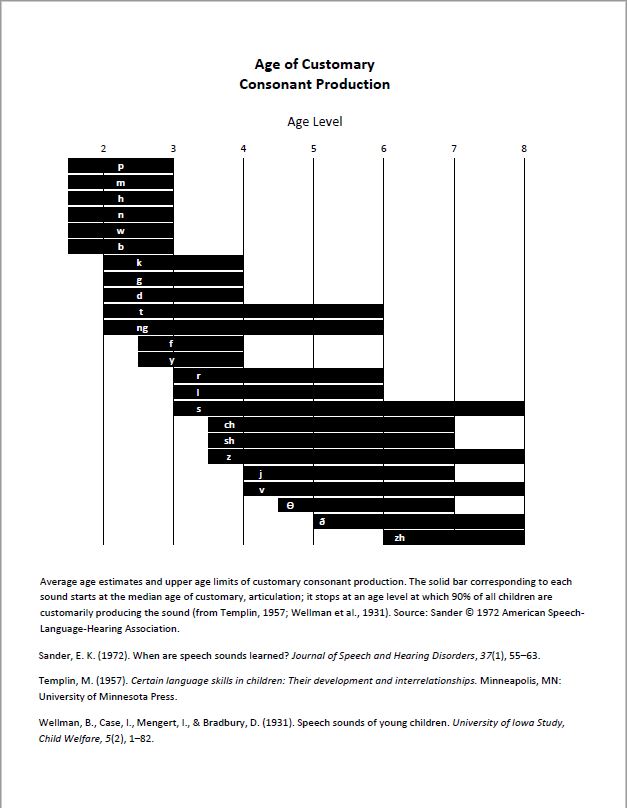Won't they just grow out of it? - Articulation Edition
In this post I want to answer a common question people have about speech therapy. The question is, "Won't they just grow out of it?" It is a good question and worth taking some time to answer. This particular post will focus on instances where a child consistently has difficulty saying one or more sounds.
"I weally want a wowipop, mommy!" This is a very cute and developmentally appropriate thing for a 4 year old to say, but what about a 10 year old? Research shows that 90% of 6 year olds are able to say the "r" and "l" sound. I have included a chart below from the American Speech-Language-Hearing Association (ASHA). This chart shows the guidelines we use to determine when to start therapy. There is more that goes into the decision than just this chart, but it is a good resource to help understand whether a child is past the age where they typically "grow out of it".
I am a huge proponent of letting "kids be kids". There is so much pressure in this day and age to grow up way too fast. That is why I appreciate research like this that helps us know when a kid is just being a kid, and when they need a little help from us to meet their developmental milestones. Does a 3 year old need to be in speech therapy for their "th" sound? Of course not! At that age they are likely to grow out of it, and working on "th" would just be frustrating because they are not developmentally ready yet.
I am also a huge proponent of working on sounds as soon as it is developmentally appropriate to do so. I recently heard of a young man who was looking to get speech therapy for his "r" sound. He was a college graduate and was interviewing for jobs when a potential employer gently encouraged him to get speech therapy. Think about how much harder it is for a 23 year old to work on "r" than a 5 or 6 year old!
So the answer to "Won't they just grow out of it?" is "sometimes!" Sometimes they will, and sometimes they won't. The chart above gives some good guidelines to know if it is time to intervene. If you are concerned about your child's articulation, ask yourself the following questions:
"I weally want a wowipop, mommy!" This is a very cute and developmentally appropriate thing for a 4 year old to say, but what about a 10 year old? Research shows that 90% of 6 year olds are able to say the "r" and "l" sound. I have included a chart below from the American Speech-Language-Hearing Association (ASHA). This chart shows the guidelines we use to determine when to start therapy. There is more that goes into the decision than just this chart, but it is a good resource to help understand whether a child is past the age where they typically "grow out of it".
I am a huge proponent of letting "kids be kids". There is so much pressure in this day and age to grow up way too fast. That is why I appreciate research like this that helps us know when a kid is just being a kid, and when they need a little help from us to meet their developmental milestones. Does a 3 year old need to be in speech therapy for their "th" sound? Of course not! At that age they are likely to grow out of it, and working on "th" would just be frustrating because they are not developmentally ready yet.
I am also a huge proponent of working on sounds as soon as it is developmentally appropriate to do so. I recently heard of a young man who was looking to get speech therapy for his "r" sound. He was a college graduate and was interviewing for jobs when a potential employer gently encouraged him to get speech therapy. Think about how much harder it is for a 23 year old to work on "r" than a 5 or 6 year old!
So the answer to "Won't they just grow out of it?" is "sometimes!" Sometimes they will, and sometimes they won't. The chart above gives some good guidelines to know if it is time to intervene. If you are concerned about your child's articulation, ask yourself the following questions:
- Does my child have trouble saying sounds that 90% of their peers have mastered?
- Is my child getting frustrated when trying to say certain sounds?
- Do people have trouble understanding my child?
- Is my child having difficulty with many different sounds?
If you have any questions about this or anything else speech and language related, feel free to contact me at courtneysmith@playtolearnspeech.com!

Comments
Post a Comment